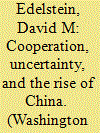| Srl | Item |
| 1 |
ID:
159270


|
|
|
| 2 |
ID:
141562


|
|
|
|
|
| Summary/Abstract |
In February 2015, when U.S. President Barack Obama released his second and final National Security Strategy—a formal outline of the administration’s foreign policy —it was met with the usual fanfare. Critics and defenders debated its principles and priorities. Prospective presidential candidates piggybacked off the release to highlight their own security agendas, hoping to score political points and broadcast their resolve. Others were simply relieved that the president, who often seemed allergic to explaining his grand strategy, had given voice to one.
|
|
|
|
|
|
|
|
|
|
|
|
|
|
|
|
| 3 |
ID:
055438


|
|
|
| 4 |
ID:
053519


|
|
|
| 5 |
ID:
175850


|
|
|
|
|
| Summary/Abstract |
How do various temporal dynamics affect international politics? Time has been gaining more attention in recent years in the literature on politics, generally, and international relations, more specifically, but no effort has been made systematically to apply these insights to the case of power transitions. This article explores how four different factors—time horizons, timing, sequencing, and trajectories—influence the way that states behave, specifically in the context of power transitions. Each of these dynamics contributes to a richer understanding of the nature of great power cooperation and competition. For each of these four dynamics, the article lays out the logic of what each uniquely adds to the existing literature on power transitions and then demonstrates the logic by drawing on the historical record of power transitions. Then, the article examines a variety of factors at the individual, state, and systemic level that might influence how each of these temporal dynamics unfolds. Throughout, the article comments on implications of the argument for contemporary relations between the United States and China.
|
|
|
|
|
|
|
|
|
|
|
|
|
|
|
|
| 6 |
ID:
060772


|
|
|
|
|
| Publication |
2005.
|
| Description |
p89-104
|
| Summary/Abstract |
Public diplomacy’ has become the holy grail of American foreign policy. In a Washington polarised by sharp partisan divisions, few issues have generated as much consensus. Numerous recent reports from think tanks, blue-ribbon commissions and government advisory groups offer recommendations for how the United States could improve its efforts to sway public opinion abroad, but public diplomacy is the object of a neverending, ultimately futile quest. While the tone and style of US foreign policy could stand improvement, the rest of the world is far more troubled by its substance. Rather than fixating on public diplomacy, pundits and policy makers alike should recognise that America's power and policies are the problem, not its inability to communicate.
|
|
|
|
|
|
|
|
|
|
|
|
|
|
|
|